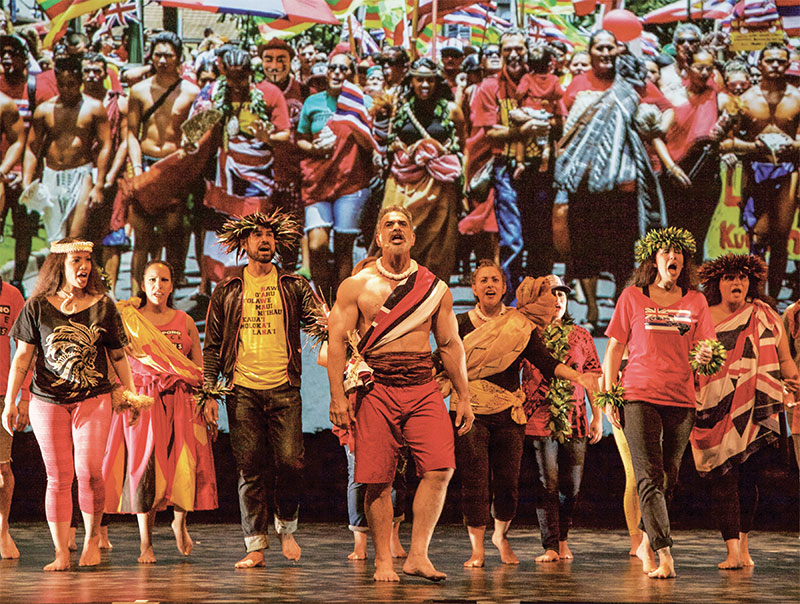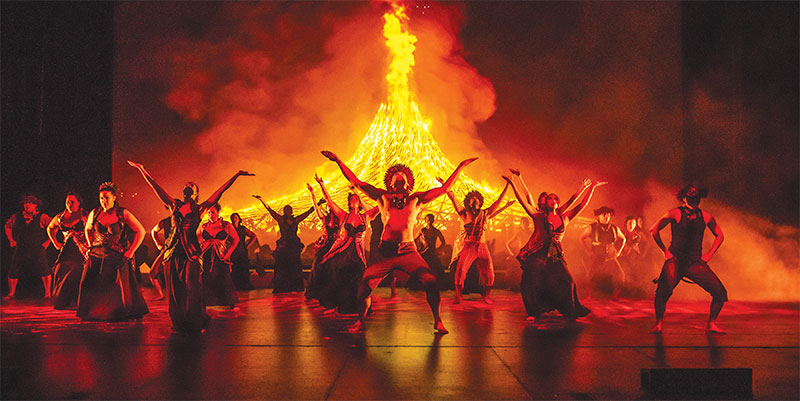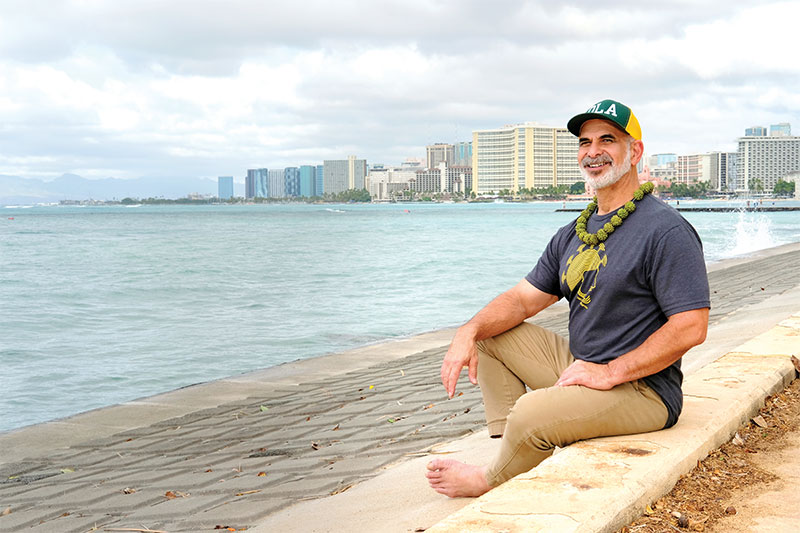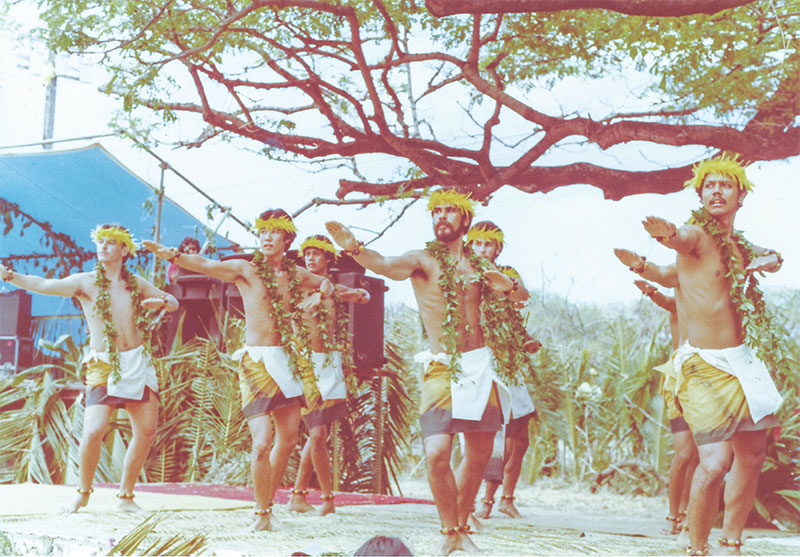A MacArthur for a Master
Kumu hula Patrick Makuakāne has been transforming lives for decades. Now, the MacArthur Foundation is changing his with its fellowship award.
Many may remember Burning Man 2023 for the relentless showers that turned Nevada’s Black Rock Desert into a mud-soaked mess and left tens of thousands of artsy, counterculture types temporarily stranded.
Among the throng caught smack dab in the middle of those saturated and unpleasant conditions was Patrick Makuakāne. But his memory of the festival is assuaged by the fact that not even a torrential downpour could rain on his parade — not when he was about to be showered with one of the greatest honors of his life.

A very buff Patrick Makuakāne, center, has been able to flex his creative muscles through shows like The Natives Are Restless. LIN CARIFFE PHOTO
As the distinguished kumu hula and cultural preservationist recollects, it was amid the deluge that he received an unexpected droplet from heaven — dew that descended in the form of a voice message from the MacArthur Foundation.
“I’m thinking, ‘What is the MacArthur Foundation calling me for? Do I owe them money?’” recalls Makuakāne with a chuckle.
On the contrary, the news was that he had been named a 2023 MacArthur Fellow and, as part of that distinction, he was to be gifted a generous amount of cash — specifically, $800,000 paid in quarterly installments over the next five years — to continue expanding upon what he already does so well in the hula cosmos.

Makuakāne’s dance company Nā Lei Hulu I Ka Wēkiu was one of the hottest acts at Burning Man 2019. LIN CARIFFE PHOTO
Colloquially referred to as “the genius grant,” the yearly MacArthur award celebrates individuals who demonstrate exceptional creativity in their work through “no-strings-attached fellowships.” While recipients’ past accomplishments are taken into account, the honor ultimately is an investment in those who show “originality, insight and potential,” according to the foundation’s website.
Naturally, Makuakāne was thrilled to receive such a prestigious honor.
“How do you even begin to bring that into your world?” he says. “I know what I’m doing here in San Francisco is my little slice of life. I’ve developed a nice world of teaching hula, it’s been successful, I love it and I’m happy.
“But you don’t expect anyone from MacArthur Foundation to hear about it.”
The affable kumu finds humor in being grouped with 19 other honorees — among them a computer scientist and statistician, a cellular and molecular biologist, an environmental engineer and a U.S. poet laureate.
“I joke about that — oh, this year’s winners are environmental attorneys, legal scholars … and a hula dancer!” quips the man who often refers to himself as “the world’s most imperfect kumu hula.”
Yet even he recognizes the crucial societal role he plays in elevating others through the power of hula.
“MacArthur Foundation figured out it’s all just the same, too, because hula is as important as all the other activities that the scholars are doing,” acknowledges Makuakāne. “Hula is transformative. I’ve seen firsthand how it changes people’s lives, what it’s done for mine. So, I understand what hula is, what it can be, and what culture and community can do for individuals.”
For the 62-year-old master teacher, providing people with a secure location to gather and express themselves is what still motivates him after decades of dancing and promoting his craft.
“I’ve been doing hula for almost 50 years and what I’ve come to understand, especially here in San Francisco, is that, yes, culture is important and so is dance,” he says. “But the most important thing about what I do is developing and providing community, a safe place for people to be acknowledged, a place where everyone feels welcome but where everyone also puts in the work to ensure that we move forward.
“It’s not easy to develop all these qualities. But when it works, it works really well. As a community, we can do so much. I mean we’re a juggernaut if we’re all putting our minds together to complete a task.”
The overpowering force Makuakāne is referring to is his dance company, Nā Lei Hulu I Ka Wēkiu, which has been a staple of the San Francisco scene for nearly four decades. Yet the master teacher admits its birth was one of circumstance rather than intention. Back in 1985, he and his partner relocated to the city by the bay to open “a real fancy French restaurant,” yet Makuakāne believed their stay there would be temporary.
“We were going to save money and then move back to Hawai‘i because I wasn’t going to leave hula, although I could do it for a year,” he explains. “But after a couple months, I was like, ‘I kind of like it over here.’”
To better cope with being away from the islands, Makuakāne decided to offer hula lessons. Almost immediately, people began signing up for his classes.
“It was a way for those people who had left Hawai‘i to stay in touch with Hawai‘i. All these people who never thought of taking hula when they were at home, they weren’t even interested in it, but now this was a vehicle for them to remain in touch with their culture,” he explains.
In many ways, the very liberated and progressive Bay Area was the perfect haven for Makuakāne to plant roots and explore his creative side.
“I’d say that San Francisco unshackled me whereas Hawai‘i always kept me bound to our traditions,” he asserts. “It was like you could do almost anything in this city and people would support you.
“That was the beginning of me flexing my creative muscles.”
Since then, Makuakāne — who sees himself as both a cultural preservationist grounded in long-established customs and a maverick unafraid of exploring new territory — has shined through an evolving style he refers to as “hula mua,” which blends traditional hula with contemporary art forms. By combining his own unique take on the dance with theatrical staging and innovative choreography, he’s been able to create a smorgasbord of shows at venues from San Francisco to Hawai‘i, New Orleans to New York, tackling hot-button topics such as colonialism and sovereignty with The Natives Are Restless (1996), and gender fluidity in Hawaiian culture with Māhū (2022).
Along the way, he’s found time to work as a spiritual and cultural adviser for the incarcerated, giving inmates at San Quentin State Prison something to believe in as an evangelist of sorts for hula. He’s also accumulated his share of honors, including the Hewlett & Gerbode foundations’ Choreographer Commissioning Award for Ka Leo Kanaka (2012), the Native Arts & Cultures Foundation’s Artist Fellowship (2014), and a slew of Isadora Duncan Dance Awards, or Izzies, highlighted by Best Company Award (2010) for the Roberta Flack classic The First Time Ever I Saw Your Face.
In fact, Flack was so impressed with the dance company’s rendition of her song that back in January, she requested a live performance at her home in Utah. Makuakāne agreed, if only to pay tribute to the legendary artist who’s currently battling Lou Gehrig’s disease.
“She’s in dire straits … the only way she’s keeping her spirits and hopes alive while she’s in this debilitating state because she cannot eat, she cannot talk … is through art. It keeps her alive now,” he says.
The 30-minute set, which consisted of Makuakāne and six of his dancers, turned out to be a memorable one for the venerable kumu hula.
“Roberta was so gracious … it was a moment,” he notes. “What a huge honor that was.”
When Makuakāne was 10, he got his first taste of hula during an Explorations class at Kamehameha Schools, and immediately rejected it.
It wasn’t because he found the dance form displeasing; rather, hula made him uncomfortable about his own identity. As a result, he laid his internal conflict at the feet of his kumu, an openly gay man.
“I was looking at him and thinking, ‘That’s how I goin’ become — a sassy, big muffy, too?” recalls Makuakāne, who was raised in Kaimukī and attended nearby St. Patrick and Saint Louis schools.
“Looking back, it was my own internal homophobia, and because I hadn’t come out yet, I was thinking, ‘The whole world will know I’m māhū!’” he continues. “But I laugh about this now because I came to love this person for his muffiness, for his flamboyance — I celebrate that. But back then, it was all about me being scared of it.”
Makuakāne’s rejection of hula eventually ended at Saint Louis after kumu hula John Keola Lake didn’t take kindly to the youngster’s demand of “only singing Hawaiian songs and not dancing the hula.”
“He looked at me and said, ‘In this club, you dance hula and you sing, and if you don’t like it, there’s the door!’” recounts Makuakāne, who sheepishly agreed to the rule.
Two weeks later, he was fully converted to the dance form.
“It just grabbed me in a way that I knew I was going to be doing it for the rest of my life,” confesses Makuakāne, who later studied hula under Robert Uluwehi Cazimero and Mae Kamāmalu Klein.
“But I also knew that I was going to eventually be teaching it, too.”
Based on all the accolades he’s received and the thousands of lives impacted over his career, it’s safe to say that many are grateful for Makuakāne’s willingness to be “hooked” by hula and ultimately share his love of the Hawaiian culture with others.
As for what lies ahead, he acknowledges that he’ll soon have to decide how to use the “exorbitant amount of money” from MacArthur Foundation.
One idea he’s kicking around is collaborating with several Native Hawaiian artists whose work he admires, and coming up with projects “that’s inspired by what they do.”
A second goal is a bit more self-serving but necessary to transform his home life.
“What’s important to me is finally having a bathroom that a gay man in his 60s deserves, gunfunnit!” he says with a bit of sass. “It’s like a friggin’ closet. Can I at least have one that’s as big as two closets?!”








